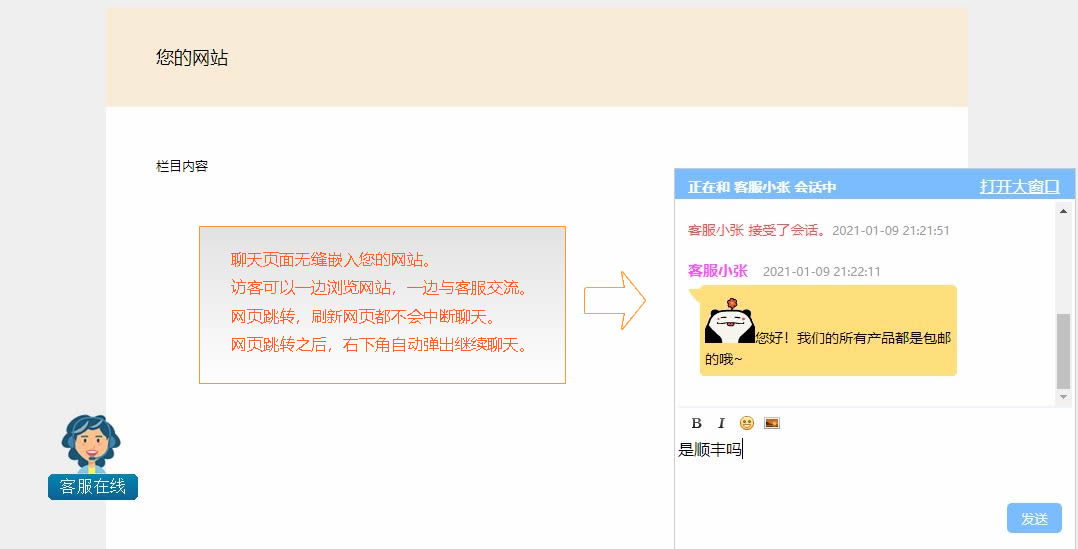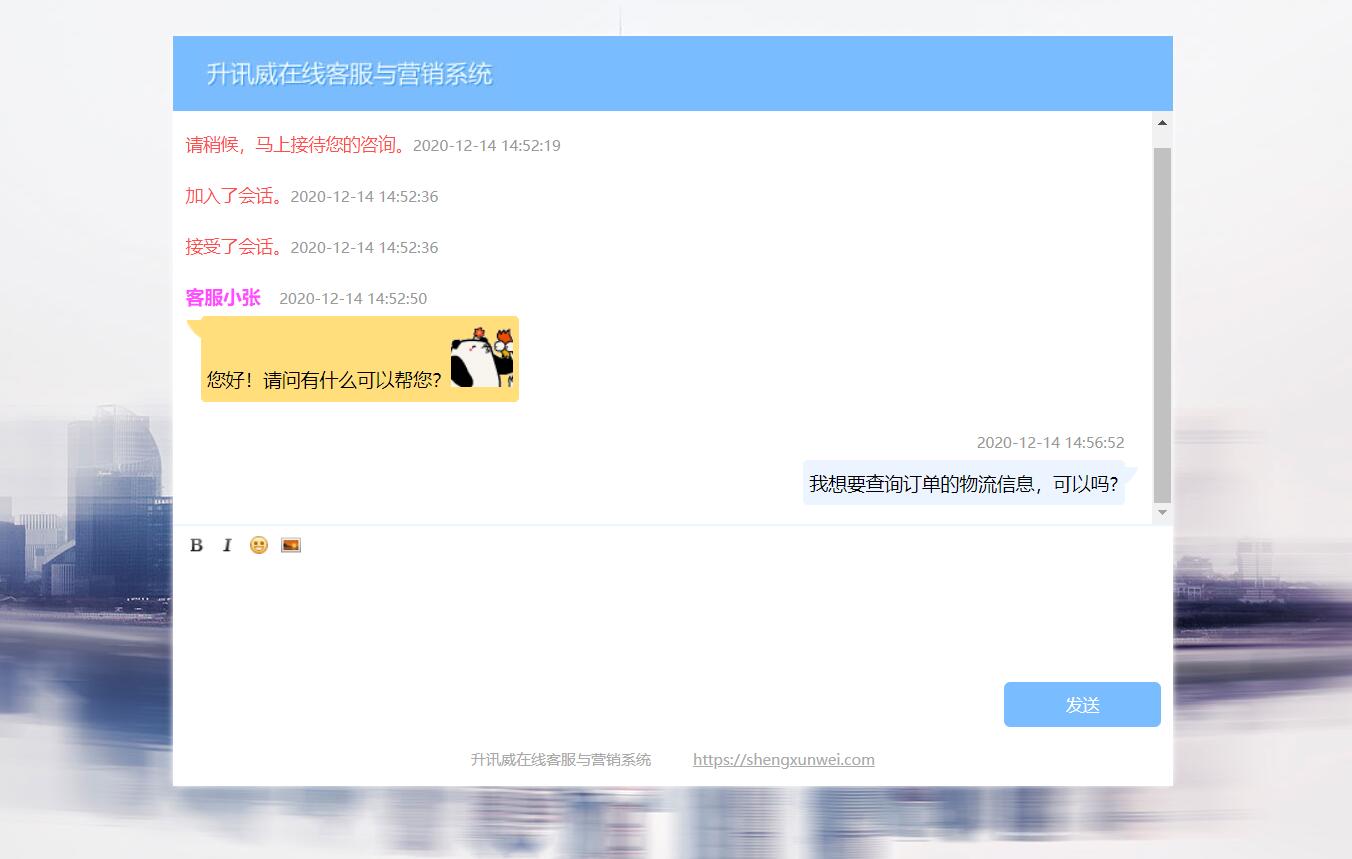.net core 和 WPF 开发升讯威在线客服系统:使用线程安全的 BlockingCollection 实现高性能的数据处理
本系列文章详细介绍使用 .net core 和 WPF 开发 升讯威在线客服与营销系统 的过程。本产品已经成熟稳定并投入商用。
免费使用 & 私有化部署:https://kf.shengxunwei.com
视频实拍:演示升讯威在线客服系统在网络中断,直接禁用网卡,拔掉网线的情况下,也不丢消息,不出异常。
https://blog.shengxunwei.com/Home/Post/fe432a51-337c-4558-b9e8-347b58cbcd53
对于在线客服与营销系统,客服端指的是后台提供服务的客服或营销人员,他们使用客服程序在后台观察网站的被访情况,开展营销活动或提供客户服务。在本篇文章中,我将详细介绍如何在 .net core 环境下使用 TCP 通信技术实现稳定高效与安全的客服端程序。
这里存在几个技术难点需要注意:
- 需要使客服端程序具备 24 小时不间断运行的能力,在处理网络通信时,必须100%的稳定。
- 必须具备应对网络波动的能力,不能网络稍有波动就断线。即使出现了短暂的网络中断,客服程序也不能做掉线处理,而是要具备保持和自动重连的能力。
- 要考虑安全性问题,服务端的端口监听,要能识别正常客服端连接,还是来自攻击者的连接。
访客端实现的效果:


访客端在手机上的效果:
后台客服的实现效果:
线程安全集合
System.Collections.Concurrent 命名空间,其中包含多个线程安全且可缩放的集合类。 多个线程可以安全高效地从这些集合添加或删除项,而无需在用户代码中进行其他同步。 编写新代码时,只要将多个线程同时写入到集合时,就使用并发集合类。
细粒度锁定和无锁机制
某些并发集合类型使用轻量同步机制,如 SpinLock、SpinWait、SemaphoreSlim 和 CountdownEvent。 这些同步类型通常在将线程真正置于等待状态之前,会在短时间内使用 忙旋转。 预计等待时间非常短时,旋转比等待所消耗的计算资源少得多,因为后者涉及资源消耗量大的内核转换。 对于使用旋转的集合类,这种效率意味着多个线程能够以非常快的速率添加和删除项。
BlockingCollection
BlockingCollection 是一个线程安全集合类,可提供以下内容:
- 生成者/使用者模式的实现; BlockingCollection 是接口的包装 IProducerConsumerCollection 。
- 利用和方法并发添加和移除多个线程中的项 Add Take 。
- Add Take 当集合已满或为空时阻止和操作的绑定集合。
- Add Take 使用 CancellationToken 或方法中的对象取消或操作 TryAdd TryTake 。
下面的示例演示如何使用:
using System;
using System.Collections.Concurrent;
using System.Threading;
using System.Threading.Tasks;
class BlockingCollectionDemo
{
static async Task Main()
{
await AddTakeDemo.BC_AddTakeCompleteAdding();
TryTakeDemo.BC_TryTake();
FromToAnyDemo.BC_FromToAny();
await ConsumingEnumerableDemo.BC_GetConsumingEnumerable();
Console.WriteLine("Press any key to exit.");
Console.ReadKey();
}
}
class AddTakeDemo
{
// Demonstrates:
// BlockingCollection<T>.Add()
// BlockingCollection<T>.Take()
// BlockingCollection<T>.CompleteAdding()
public static async Task BC_AddTakeCompleteAdding()
{
using (BlockingCollection<int> bc = new BlockingCollection<int>())
{
// Spin up a Task to populate the BlockingCollection
Task t1 = Task.Run(() =>
{
bc.Add(1);
bc.Add(2);
bc.Add(3);
bc.CompleteAdding();
});
// Spin up a Task to consume the BlockingCollection
Task t2 = Task.Run(() =>
{
try
{
// Consume consume the BlockingCollection
while (true) Console.WriteLine(bc.Take());
}
catch (InvalidOperationException)
{
// An InvalidOperationException means that Take() was called on a completed collection
Console.WriteLine("That's All!");
}
});
await Task.WhenAll(t1, t2);
}
}
}
class TryTakeDemo
{
// Demonstrates:
// BlockingCollection<T>.Add()
// BlockingCollection<T>.CompleteAdding()
// BlockingCollection<T>.TryTake()
// BlockingCollection<T>.IsCompleted
public static void BC_TryTake()
{
// Construct and fill our BlockingCollection
using (BlockingCollection<int> bc = new BlockingCollection<int>())
{
int NUMITEMS = 10000;
for (int i = 0; i < NUMITEMS; i++) bc.Add(i);
bc.CompleteAdding();
int outerSum = 0;
// Delegate for consuming the BlockingCollection and adding up all items
Action action = () =>
{
int localItem;
int localSum = 0;
while (bc.TryTake(out localItem)) localSum += localItem;
Interlocked.Add(ref outerSum, localSum);
};
// Launch three parallel actions to consume the BlockingCollection
Parallel.Invoke(action, action, action);
Console.WriteLine("Sum[0..{0}) = {1}, should be {2}", NUMITEMS, outerSum, ((NUMITEMS * (NUMITEMS - 1)) / 2));
Console.WriteLine("bc.IsCompleted = {0} (should be true)", bc.IsCompleted);
}
}
}
class FromToAnyDemo
{
// Demonstrates:
// Bounded BlockingCollection<T>
// BlockingCollection<T>.TryAddToAny()
// BlockingCollection<T>.TryTakeFromAny()
public static void BC_FromToAny()
{
BlockingCollection<int>[] bcs = new BlockingCollection<int>[2];
bcs[0] = new BlockingCollection<int>(5); // collection bounded to 5 items
bcs[1] = new BlockingCollection<int>(5); // collection bounded to 5 items
// Should be able to add 10 items w/o blocking
int numFailures = 0;
for (int i = 0; i < 10; i++)
{
if (BlockingCollection<int>.TryAddToAny(bcs, i) == -1) numFailures++;
}
Console.WriteLine("TryAddToAny: {0} failures (should be 0)", numFailures);
// Should be able to retrieve 10 items
int numItems = 0;
int item;
while (BlockingCollection<int>.TryTakeFromAny(bcs, out item) != -1) numItems++;
Console.WriteLine("TryTakeFromAny: retrieved {0} items (should be 10)", numItems);
}
}
class ConsumingEnumerableDemo
{
// Demonstrates:
// BlockingCollection<T>.Add()
// BlockingCollection<T>.CompleteAdding()
// BlockingCollection<T>.GetConsumingEnumerable()
public static async Task BC_GetConsumingEnumerable()
{
using (BlockingCollection<int> bc = new BlockingCollection<int>())
{
// Kick off a producer task
await Task.Run(async () =>
{
for (int i = 0; i < 10; i++)
{
bc.Add(i);
await Task.Delay(100); // sleep 100 ms between adds
}
// Need to do this to keep foreach below from hanging
bc.CompleteAdding();
});
// Now consume the blocking collection with foreach.
// Use bc.GetConsumingEnumerable() instead of just bc because the
// former will block waiting for completion and the latter will
// simply take a snapshot of the current state of the underlying collection.
foreach (var item in bc.GetConsumingEnumerable())
{
Console.WriteLine(item);
}
}
}
}
本文对使用线程安全的 BlockingCollection 实现高性能的数据处理进行了简要的介绍,在接下来的文章中,我将具体解构服务端程序的结构和设计、客服端程序的结构和设计,敬请关注。
免费使用 & 私有化部署:https://kf.shengxunwei.com
联系QQ: 279060597
联系E-mail:cao.silhouette@msn.com
